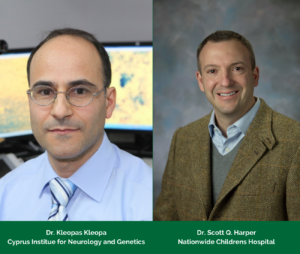Update, May 17, 2022: This work is now published in The Journal of Clinical Investigation.
 The CMT Research Foundation is pleased to announce that Dr. Kleopas Kleopa, a renowned neuromuscular disease expert, CMT scientist, and clinician, and his team from the Cyprus Institute of Neurology & Genetics, along with their collaborators Dr. Scott Q. Harper, a distinguished scientist on the development of RNAi-based treatments for neuromuscular disorders, and his team at Nationwide Children’s Hospital, have completed their gene therapy project for CMT1A. The resulting therapeutic is now being licensed by Armatus Bio for further development and potential clinical trials.
The CMT Research Foundation is pleased to announce that Dr. Kleopas Kleopa, a renowned neuromuscular disease expert, CMT scientist, and clinician, and his team from the Cyprus Institute of Neurology & Genetics, along with their collaborators Dr. Scott Q. Harper, a distinguished scientist on the development of RNAi-based treatments for neuromuscular disorders, and his team at Nationwide Children’s Hospital, have completed their gene therapy project for CMT1A. The resulting therapeutic is now being licensed by Armatus Bio for further development and potential clinical trials.
Dr. Kleopa had already studied viral gene therapy in two other forms of demyelinating CMT. We approached Dr. Kleopa about the relevance of his approach to CMT1A. After deep discussions with him and our Scientific Advisory Board, the CMT Research Foundation funded the project.
In collaboration with Dr. Scott Q. Harper at Nationwide Children’s Hospital, Dr. Kleopa’s team developed a gene therapy for CMT1A that is aimed at reducing or eliminating disease symptoms by lowering levels of PMP22, the culprit behind CMT1A. As mentioned in the Milestone 3 update, the results in CMT1A models have been very promising, with the therapy reducing PMP22 levels, improving nerve structure and function, and improving strength and balance. The therapy provided these benefits whether the treatment was given at early or later stages of the neuropathy.
Based on the strength of these data, the CMT Research Foundation increased our funding to the project to perform additional experiments to strengthen the case for the therapeutic to potential pharma partners. These experiments included longer treatment duration, analysis of the immune response to treatment, and measurement of neurofilament light as a potential biomarker for the treatment. Virtually every measure continued to support the further development of this therapy for potential use in human trials. Two and a half years after beginning discussions about this project with Dr. Kleopa, the therapeutic is showing strong results consistent with a viable treatment for CMT1A and is now being adopted by industry to accelerate development for potential clinical trials.
The asset is in the process of being licensed by emerging biotechnology innovator Armatus Bio and will be known as ARM-101. In fact, Armatus CEO Dr. Michael Triplett recently remarked, “ARM-101 is a promising therapeutic candidate with the potential to make a significant difference in many lives. These new data will enable us to attract investments to accelerate our development efforts, with the goal of reaching those who need it as soon as possible.”
Read more about this project and all the research we fund.
